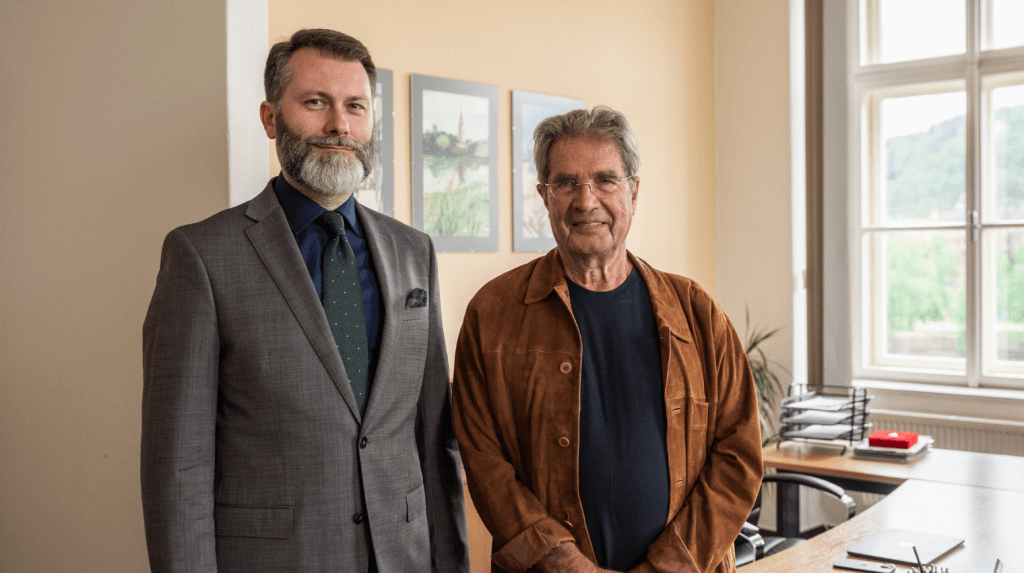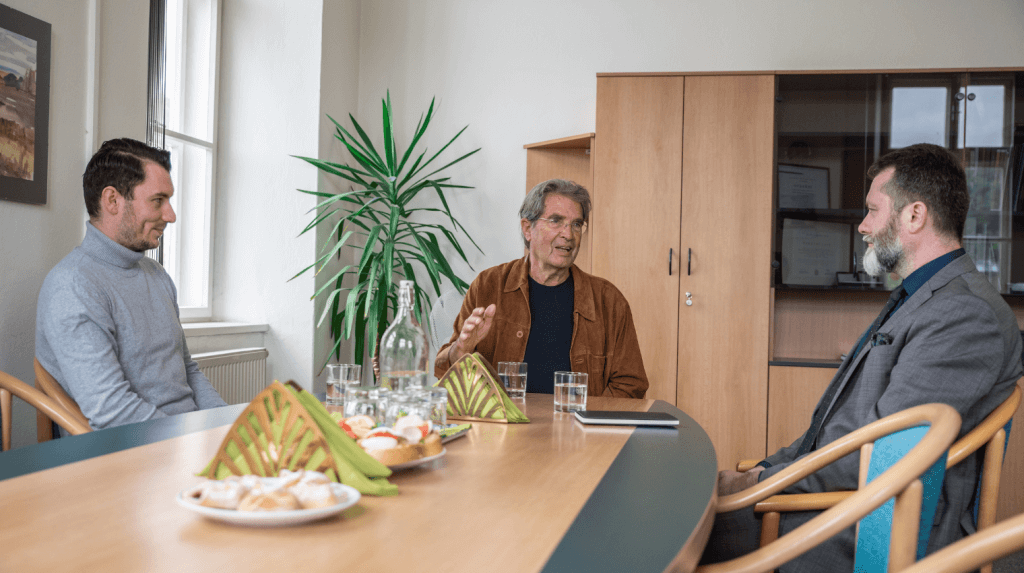Internationally renowned theorist Teun van Dijk visited Prague and discussed cooperation with FSV UK

Researchers from the Institute of Political Studies FSV UK are working on a project focusing on research on online and offline extremism with the aim of understanding the deeper causes of radicalisation of individuals and groups – both on social media and in everyday life. The project would involve the participation of Teun van Dijk, a world-renowned expert in discourse studies, who visited Prague as part of this collaboration.
The project is led by IPS PhD students Kristián Földes and Jonathan Collins. Negotiations with other European partners are led by the Head of the Department of Security Studies at IPS doc. Vít Střítecký. They are also working with experts from Macquarie University in Australia and the University of Sussex in the UK, as well as the prestigious academic research institution Vox-Pol.
Dutch professor Teun van Dijk, director of the Centre of Discourse Studies in Barcelona, and his colleagues would provide mainly theoretical and methodological support for the project. “As most of the data we analyse and will be analysing comes from social networks or interviews with individuals, their input is indispensable in this respect,” said Földes, who has been working with Prof. van Dijk since 2022, when he spent a compulsory internship at the Centre of Discourse Studies as part of his PhD studies. There, they jointly initiated a discussion about a possible deepening of the relationship between the Centre of Discourse Studies and FSV UK.

As part of this collaboration, Prof. van Dijk visited Prague after more than 40 years and offered a series of lectures entitled Words that Shape Worlds. These focused on the importance of Critical Discourse Studies within the broader social sciences, understanding its usefulness in various subfields, and also the ideology of the far right, its discourse and impact on society.
The IPS researchers now aim to formalise the collaboration with a prominent theorist over the next year to allow for more internships and teaching opportunities. In this context, Prof. van Dijk himself is taking steps to establish a large network of academics under the umbrella of the Centre of Discourse Studies, together with other scholars.
“The idea of creating a network of scholars linked to the Centre is just a first idea. One of the aims of such a network would be to organise international seminars, both online and face-to-face, for PhD students who specialise in discourse studies,” said Prof. van Dijk during his visit. “Thus, my goal and that of my colleagues is not to be left out of this club and to eventually allow our academics and students to participate in this network. I consider this as an excellent opportunity for FSV UK and its students,” Földes added.

Földes’ dissertation deals with the topic of the formation of asylum seekers’ identities through the discourse of political elites during the so-called Schengen crisis in 2015, focusing on three countries – Hungary, the Czech Republic and Slovakia. “However, the exploration of the discourse has also led me into quite different areas. I collaborated with my colleague Markéta Kocmanová on an article that looked at potential risk factors for the radicalisation of members of the Roma community in Serbia,” he says.
PhD student Jonathan Collins, who is also involved in the project, is researching online extremism on – for many an unfamiliar social network – Gab. His main interest is in understanding the workings of communities whose members are sometimes less, sometimes more openly committed to Nazi or other extremist ideology. In addition to this, he is also a member of Vox-Pol, a major global network dedicated to researching extremism around the world.
Together, the two are working on a paper that advocates the use of netnography as a methodology for social network research. “Again, I look at this topic from the perspective of how best to use discourse analysis in combination with other methods. In this respect, I consider researching the behaviour of individuals on social networks and understanding their perception of reality through their discourse as my main interest for the future,” Földes concludes.
Prof. Teun van Dijk is one of the most prominent theorists in social sciences, best known for his pioneering work in Critical Discourse Studies. In his career spanning more than fifty years, he has shaped the way we understand text, discourse and their roles in society. His extensive research has covered a wide range of topics including racism, ideologies, the far right, migration, social movements and discrimination. His work is among the most widely cited in social sciences, reflecting the profound impact of his research and thought leadership.
He is also the founder and current director of the Centre of Discourse Studies in Barcelona. His publishing activity includes more than 130 publications, both in the form of articles and books. He founded 6 major academic journals, most of which he still edits. Currently, his main focus is on writing publications and consulting with PhD students from all over the world. At the same time, he is also working to strengthen the Centre of Discourse Studies.
